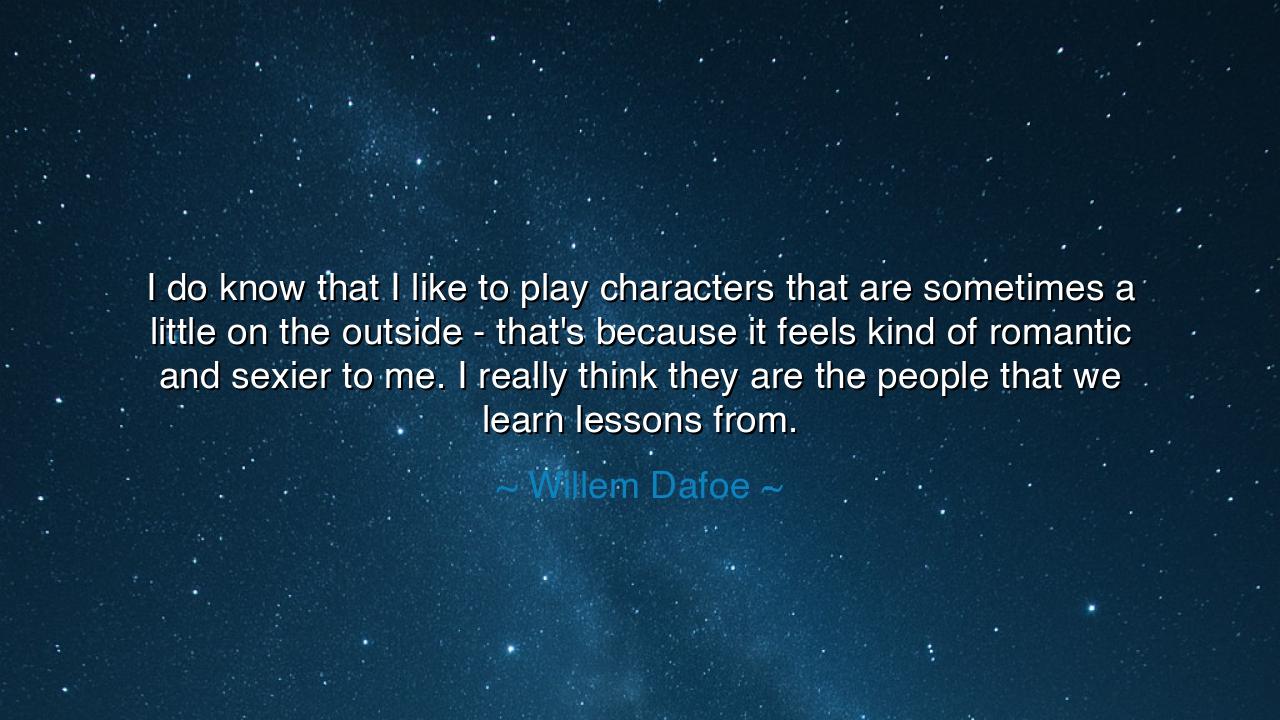
I do know that I like to play characters that are sometimes a
I do know that I like to play characters that are sometimes a little on the outside - that's because it feels kind of romantic and sexier to me. I really think they are the people that we learn lessons from.






"I do know that I like to play characters that are sometimes a little on the outside - that's because it feels kind of romantic and sexier to me. I really think they are the people that we learn lessons from." These words spoken by Willem Dafoe speak to a profound truth about the nature of outsiders—those who stand apart from the norms of society. To be on the outside is often seen as a form of alienation or rebellion, but Dafoe reveals that it is precisely in this separation from the norm that a deeper form of romance and wisdom can be found. The outsiders, in their nonconformity, offer perspectives that challenge the status quo, and it is from them that we often learn the most powerful lessons about identity, freedom, and the nature of the human condition.
In the ancient world, the figure of the outsider was often portrayed as a hero, a visionary, or a prophet—someone who stood apart from the established order and saw the world in a way that others could not. Socrates, for example, was a figure who challenged the conventional wisdom of his time. Though he was ostracized for his teachings and his way of life, it was precisely his outsider status that allowed him to question the values of Athens and to speak profound truths that reshaped Western philosophy. He did not conform to the expectations of society, and in doing so, he redefined what it meant to be wise. It is the outsiders—those who dare to stand apart—that often carry the lessons that transform the world.
Think of the great poets and artists of the Renaissance, many of whom were considered outsiders in their time. Leonardo da Vinci, a man whose genius spanned both art and science, was often criticized for his unconventional ideas and methods. Yet, it was his nonconformity, his refusal to be boxed into traditional ways of thinking, that led to the revolutionary ideas and artworks we revere today. The Mona Lisa, for instance, was a painting that broke all conventions of portraiture, and yet it became one of the most iconic works of art in history because it dared to be different. The outsider perspective—like that of Da Vinci—offers a fresh, sometimes unsettling view of the world that challenges us to think in new ways.
In Dafoe’s work as an actor, he often embodies characters who live on the margins of society. These roles are not simply about alienation or rebellion, but about exploring the depths of the human experience through those who are not bound by societal norms. The outsider is often more authentic, more willing to confront the truths that others may shy away from. By stepping outside the conventional, these characters can see what others cannot, and their journeys often reveal the fragility of the world around them. This, Dafoe suggests, is the essence of the romantic—it is the person who dares to live without the constraints of convention that offers the most profound insight into the human spirit.
Consider, too, the story of Prometheus, the Titan who defied Zeus, the king of the gods, to bring fire to humanity. Prometheus was an outsider, cast down by Zeus for his act of defiance. Yet, it was through this very act of rebellion that humanity received the gift of fire—an act that would lead to civilization and progress. Prometheus was not only a figure of defiance, but a symbol of the visionary outsider who, through his separation from the norm, gave the world something of lasting value. His story is a reminder that the outsider often carries the potential to change the world, even if their actions are initially misunderstood or rejected.
The lesson, dear listener, is this: nonconformity is not always to be feared, nor is alienation always a curse. The outsiders—those who live on the edges of society, who refuse to conform to its expectations—often carry the wisdom that others cannot see. Their romance lies not in seeking acceptance or approval, but in their willingness to live authentically, to stand apart from the crowd, and to offer the world something new. It is from these individuals that we often learn the most about the human spirit—about what it means to truly live and to see the world through fresh eyes.
So, I say to you, as you journey through life: do not be afraid to stand apart. Embrace the outsider within yourself, for in doing so, you may find the courage to ask the questions that others dare not ask, to seek the answers that others may never find. Be romantic in your quest for truth, and know that it is often those who are different who bring the greatest change to the world. Whether in art, philosophy, or life itself, it is the outsiders who shape the future, one lesson at a time.






AAdministratorAdministrator
Welcome, honored guests. Please leave a comment, we will respond soon